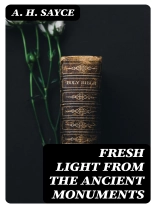In ‘Fresh Light from the Ancient Monuments, ‘ A. H. Sayce delves into the intersection of archaeology, history, and biblical studies, demonstrating how ancient artifacts and inscriptions can illuminate our understanding of the early Near East. Employing a scholarly yet accessible style, Sayce examines various archaeological findings, including cuneiform tablets and monumental inscriptions, to uncover insights into the cultures and civilizations that shaped the biblical narrative. He situates his work against the backdrop of the late 19th-century archaeological movement, emphasizing the transformative impact of these discoveries on traditional interpretations of biblical texts and their historical contexts. A. H. Sayce was a prominent Assyriologist and a key figure in the study of ancient languages, whose academic endeavors were fueled by a profound belief in the relevance of historical context to scriptural interpretation. Educated at Oxford, Sayce’s expertise in Semitic languages and his keen interest in the archaeological revolution of his time compelled him to produce this pioneering work, aiming to bridge the gap between ancient texts and their material culture. ‘Fresh Light from the Ancient Monuments’ is an essential read for scholars and enthusiasts of biblical archaeology. Sayce’s meticulous research and engaging narrative not only enrich our understanding of ancient societies but also invite readers to reconsider the historical underpinnings of biblical texts. This book is a remarkable contribution to the field, making it indispensable for anyone interested in the convergence of archaeology and theology.
Despre autor
Archibald Henry Sayce (1845–1933), distinguished as a pioneering Assyriologist and linguist, was a prolific British scholar renowned for his substantial contributions to the field of ancient Near Eastern studies. Sayce’s academic pursuits led him to become one of the principal figures in deciphering cuneiform script, thereby unlocking a wealth of knowledge concerning the civilizations of Mesopotamia, Persia, Anatolia, and their environs. Graduating from Oxford, where he later assumed the role of Professor of Assyriology, Sayce’s mastery of ancient languages underpinned his scholarly works. His publication ‘Fresh Light from the Ancient Monuments’ is a quintessential example of his ability to synthesize archaeological findings with philological expertise, in which he elucidates the civilizations of the Biblical world in light of contemporary archaeological discoveries. Known for his accessible literary style, Sayce aimed to make the complex findings of Assyriology comprehensible to the educated public. He was an erudite author whose eloquent expositions and insightful interpretations garnered significant attention and made a lasting impact on the study of ancient languages and the cultural heritage of the Near East.












